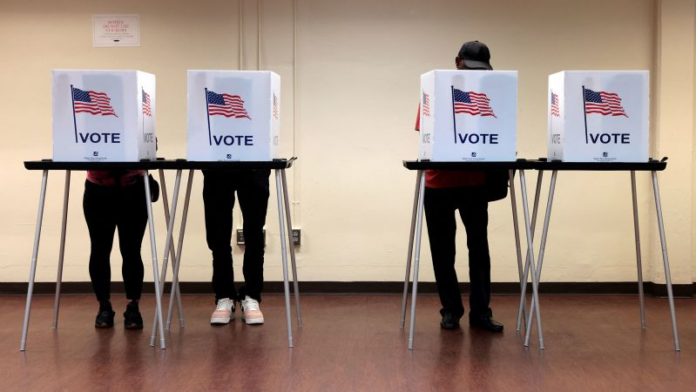CNN —
Election polls can’t foretell who will win the presidential election. They’re inherently imprecise. They carry the potential for error.
All that being the case, polls this year have found plenty that’s meaningful about how voters think about politics in 2024 – from Americans’ broad-ranging pessimism about the political landscape to the deep divide in values between supporters of Donald Trump and Kamala Harris.
As a rule, polling provides a snapshot of opinions, rather than a prediction about how people may act in the future – whether that’s how they’ll eventually vote or any other decisions they might make. That’s especially true of this election, with surveys showing no clear leader in the presidential race, either nationally or in the septet of swing states likely to prove decisive to the outcome. And although most surveys suggest a tight race, a more decisive victory for either candidate remains well within the realm of possibility.
“Shifts of a single point can be consequential to the outcome but are beyond the ability of most polls to capture with any precision,” Patrick Murray, the director of the Monmouth University poll, wrote last week.
But throughout the year, polling data has helped to capture the contours of the 2024 race, with several findings that fall well outside the margin of error. The election is playing out against a fundamentally bleak backdrop: The share of voters who say things in the US are going badly is higher than in any pre-election poll since 2008, and President Joe Biden’s approval rating has remained consistently and significantly underwater. At the same time, to an unusual extent, the earliest days of the race were largely a referendum on Trump, rather than the incumbent. That dynamic shifted somewhat when Biden was replaced on the ticket by Harris, touching off an immediate surge in Democratic motivation.
While the results of issue polls can sometimes vary based on framing, some results have been remarkably robust. Americans continue to be broadly opposed to the Supreme Court decision overturning Roe vs. Wade, with opposition consistently registering above 60% in CNN polling over the past two years. Other issues show deep political divides: In CNN polling this fall, Trump supporters were 46 percentage points likelier than Harris supporters to say that growing diversity poses a threat to American culture, which coincided with the Trump campaign’s increasing reliance on anti-migrant rhetoric.
Here are more findings from the polls about this year’s election:
Which issues matter to which voters?
Economic issues rate more prominently for voters than they have in any presidential election since the Great Recession, a Gallup poll released in October found, with concerns about democracy also scoring high this year.
Thinking an issue is important, of course, doesn’t necessarily imply a vote solely on that basis, but top-issue polling gives a sense of which concerns and campaign themes are resonating most with different parts of the electorate. The Gallup poll, notably, found a stark partisan divide, with no overlap between the top five issues for Republican and Republican-leaning voters and Democrats and Democratic leaners. Among GOP-aligned voters, the top-ranking issues are the economy, immigration, terrorism and national security, crime and taxes; among Democratic-aligned voters, they are democracy in the US, Supreme Court justices, abortion, health care and education.
How Trump and Harris supporters differ in their visions for America
Partisan divides on the issues run further than priorities.
A Pew Research Center report released this summer catalogued the differences between each candidates’ supporters “on issues that have divided Americans for decades, such as the role of guns in society, race and the legacy of slavery.” Harris supporters were more than 50 points likelier than Trump supporters to say that the legacy of slavery continues to have a significant impact on Black people in America today and that “America’s openness to people from all over the world is essential to who we are as a nation.”
Trump supporters were more than 40 points likelier than Harris supporters to say that gun ownership increases safety and that the criminal justice system in the country is insufficiently tough.
Which campaign news is breaking through?
For much of the general election, a polling project called The Breakthrough, asked Americans a simple question – what have they seen, heard, or read lately about each of the candidates?
In the last weeks of the campaign, Harris’ media appearances and Trump’s rallies got a lot of attention. And though no single topic has proved as dominant throughout the election as the pandemic was in 2020, the words “liar” and “lies” have consistently shown up prominently in the public conversation around Trump.
The Breakthrough findings have also helped chart the tumultuous final days of the Biden campaign, the battle to frame Harris as a candidate and the way that Trump’s September debate performance helped to elevate fringe false claims about migrants to the national stage.
Polling data is a single, imperfect gauge of people’s opinions – which may not always be morally, or even factually, correct. But polls of the US, ultimately, are a means of talking to Americans across a wide range of demographics, life experiences and views, on topics that stretch far beyond elections, or even politics. In a deeply fragmented society, and with social media often reflecting an unrepresentative sample of the loudest voices, they’re still a valuable tool for understanding the country as a whole.



